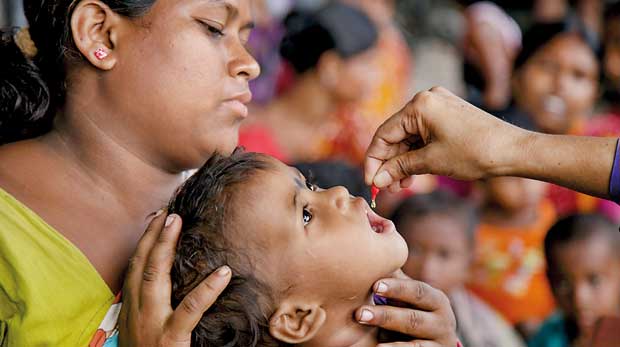23 Feb 2018 - {{hitsCtrl.values.hits}}

 Worm infections are a common ailment, especially when bringing up children. But it can become a nightmare for parents because of their recurrence and their ability to spread easily, making the whole family affected in no time. Though barely visible to the naked eye, during most times, they can disturb the sleep and the children’s ability to study, even affecting their long term health, at times. Health Capsule consulted Dr. Deepal Perera, Consultant Paediatrician of the Apeksha Hospital, Maharagama, to obtain more information about worm infections in children.
Worm infections are a common ailment, especially when bringing up children. But it can become a nightmare for parents because of their recurrence and their ability to spread easily, making the whole family affected in no time. Though barely visible to the naked eye, during most times, they can disturb the sleep and the children’s ability to study, even affecting their long term health, at times. Health Capsule consulted Dr. Deepal Perera, Consultant Paediatrician of the Apeksha Hospital, Maharagama, to obtain more information about worm infections in children.
Following are excerpts of an interview done with Dr. Perera.
Q What are the types of worm infections that are present in Sri Lanka?
There is the pin worm or the thread worm, called Enterobias vermicularis, which is the commonest infection in Sri Lanka. The worm is small and white in colour.
Then there is the round worm, called Ascaris lumbricoides. The worms are long and thick. Hookworms, called Necator americanus, have teeth that they use to get attached to the intestinal wall.
In addition to these common worm species, filarial worms, the species causing filarisis in humans as well as the species causing filarisis in cats and dogs can also infest our bodies.

Q When should you suspect that your child is having a worm infection?
Well, the symptoms differ according to the type of worm that infects you. When infected with thread worms, the commonest worm infection in Sri Lanka, scratching around the anal area, called pruritus ani, is the commonest symptom.
This usually occurs at night and the cause is female worms coming outside the gastrointestinal tract to lay eggs. This may also cause irritability in the child leading to poor sleep and bed wetting.
Symptoms of anaemia can be seen in children infected with hookworms as well during severe round worm infections. They can be present with lethargy, pale skin, as well as with the condition called pica, where the person eats substances like raw rice or earthenware.
During hookworm infections, there is itching in the skin between the toes, called the ground itch. This is due to the worms entering the body by piercing the skin of the feet.
Severe round worm infection can present as nausea and vomiting and poor appetite, as well as malnutrition of the child, due to the heavy colonization of the worms. We have observed children presenting with worms coming out of their mouths and obstructing their intestines, though it’s very rare nowadays.
They can also present with respiratory tract problems like cough at night as well.
Q How do the worms enter the body?
Again, the method differs from worm to worm. Most worms enter through our mouth. Eating food with unwashed hands, eating raw vegetables (containing eggs of the worms), even sleeping on an unwashed bedspread in the case of threadworm can result in spreading the infection.
Hookworms can live in the soil and will infect through a pierced skin, while filarisis worms will enter the bloodstream when an infected insect bites you.
Q How do you diagnose a worm infection?
When a child is suspected of having a worm infection, further investigations may be needed to confirm the diagnosis. Usually, the type of white blood cells called eosinophils is increased during a worm infection.
The type of worm can be identified either by identifying the worm itself or its eggs, since each species has different eggs. This can be done through a Stool Full Report.
Special tests like filarial antibody test for filarial worms and tape test in threadworm infection are also conducted when needed.
QHow is a worm infection treated?
There are a number of drugs that can be used to treat worm infections. They are Mebendazole and Pyrantel Pamoate, both in the syrup and tablet form.
The two most important things to consider when taking de-worming treatment are treating the whole family at once and taking a second dose, 7-10 days following the initial dose.
This is important because there is a high chance of re-infection. As we discussed earlier, they are easily spread and therefore likely that other members of the family may also have the infection. If a single person is treated, even though he gets cured, it’s likely that he will be re-infected from a family member.
A second dose of drug, given a week after the first dose, is an important point that even doctors sometimes neglect in prescribing. This step is crucial because even though the worms are killed, their eggs may survive, and will give rise to new worms through hatching, which will prolong the infection.
Q What steps do we have to take to prevent worm infections?
Following basic rules of food hygiene, like washing the hands before eating and washing vegetables and leaves well, before preparation can go a long way towards prevention. Eating uncooked food, especially green leaves from questionable sources should be avoided, especially during floods.
In addition to routine de-worming through drugs, washing the clothes thoroughly and sun drying them well will help destroy the eggs and prevent the further spreading of the infection.
Wearing slippers when walking outside and regularly de-worming your pets will also help prevent worm infections.
22 Dec 2024 8 hours ago
22 Dec 2024 9 hours ago
22 Dec 2024 22 Dec 2024
22 Dec 2024 22 Dec 2024
22 Dec 2024 22 Dec 2024